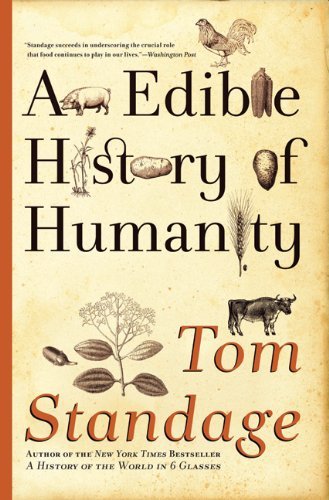More than simply sustenance, food historically has been a kind of technology, changing the course of human progress by helping to build empires, promote industrialization, and decide the outcomes of wars. Tom Standage draws on archaeology, anthropology, and economics to reveal how food has helped shape and transform societies around the world, from the emergence of farming in China by 7500 b.c. to the use of sugar cane and corn to make ethanol today. An Edible History of Humanity is a fully satisfying account of human history. Tom Standage is business editor at The Economist magazine and the author of four works of history, including A History of the World in 6 Glasses and The Victorian Internet. He has also written for the Guardian, the New York Times, Wired, and other publications. He is married and has two children. More than simply sustenance, food historically has been a kind of technology, changing the course of human progress by helping to build empires, promote industrialization, and decide the outcomes of wars. Tom Standage draws on archaeology, anthropology, and economics to reveal how food has helped shape and transform societies around the world, from the emergence of farming in China by 7500 b.c. to the use of sugar cane and corn to make ethanol today. An Edible History of Humanity is a fully satisfying account of human history. "A fascinating history of the role of food in causing, enabling and influencing successive transformations of human society. This is an extraordinary and well-told story, a much neglected dimension of history."Financial Times "Tom Standage does an admirable job of showing the invisible fork’ behind the fate of nations."Nature "A fascinating history of the role of food in causing, enabling and influencing successive transformations of human society. This is an extraordinary and well-told story, a much neglected dimension of history."Financial Times "Never mind the contradictions, you can buy books proving that curry, oranges, salt or beef each single-handedly made our world modern. There is a certain P. T. Barnum appeal in this: you are aware codfish or whatever didn't really transform the universe by itself, but part of the fun is being taken in by the audacious cleverness of tying all of history to one foodstuff. Tom Standage could have written a similar 'noun' book. A few, in fact, since he highlights a dozen foods and spices with outsize personalities. But instead of casting backwards for one thread to stitch everything together, Standage sensibly casts a net, writing not a history of any one food but a history through food. Using this approach he demonstrates how changes in food production, technology and consumption have dragged humanity forwards from its hunter-gatherer days . . . The emphasis on food as a cultural catalyst differentiates Standage from Michael Pollan, whose plants' eye view of the world keeps the consumables central. With Standage it is not what changes in food that matters, but rather what food changes. And it's not just one food lifting and guiding history, but what Adam Smith might have called the 'invisible fork' of food economics."New Scientist "This meaty little volume . . . 'concentrates specifically on the intersections between food history and world history.' But history isn’t Standage's only concern. He takes the long view to illuminate and contextualize such contemporary issues as genetically modified foods, the complex relationship between food and poverty, the local food movement, the politicization of food and the environmental outcomes of modern methods of agriculture . . . Cogent, informative and insightful."Kirkus Reviews "Earliest civilizations appeared on earth when farmers banded together and exploited their excess crops as a means of trade and currency. This allowed some people to abandon agriculture [leading to] organized communities and cities. Standage traces this ever-evolving story through Europe, Asia, and the Americas and casts human progress as an elaboration and refinement of this foundation . . . Standage also uncovers the aspects of food distribution that underlay such historic events as the Napoleonic Wars and the fall of the Soviet empire."Mark Knoblauch, Booklist "Standage's previous book, A History of the World in 6 Glasses, theorized that the titular six drinks were reflections of the eras in which they were created. In this new work, he instead shows how one of humanity's most vital needs (hunger) didn't simply reflect but served as the driving force behind transformative and key events in history. Dividing the vast subject into six general sections (such as food's role in the development of societies and social hierarchies, its impact on population and industrialization, and its uses as a weapon both on the battlefield and off), Standage illustrates each section with historical examples and observations. Some topics, like the spice trade's encouragement of exploration, are fairly obvious choices, but the concise style and inclusion of little-known details keep the material both entertaining and enlightening. Perhaps the most interesting section is the final one, which looks at the ways in which modern agricultural needs have acted as a spur for technological advancement, with Standage providing a summary of the challenges still faced by the green revolution. Recommended."Kathleen McCallister, University of South Carolina Library, Columbia, School Library Journal
